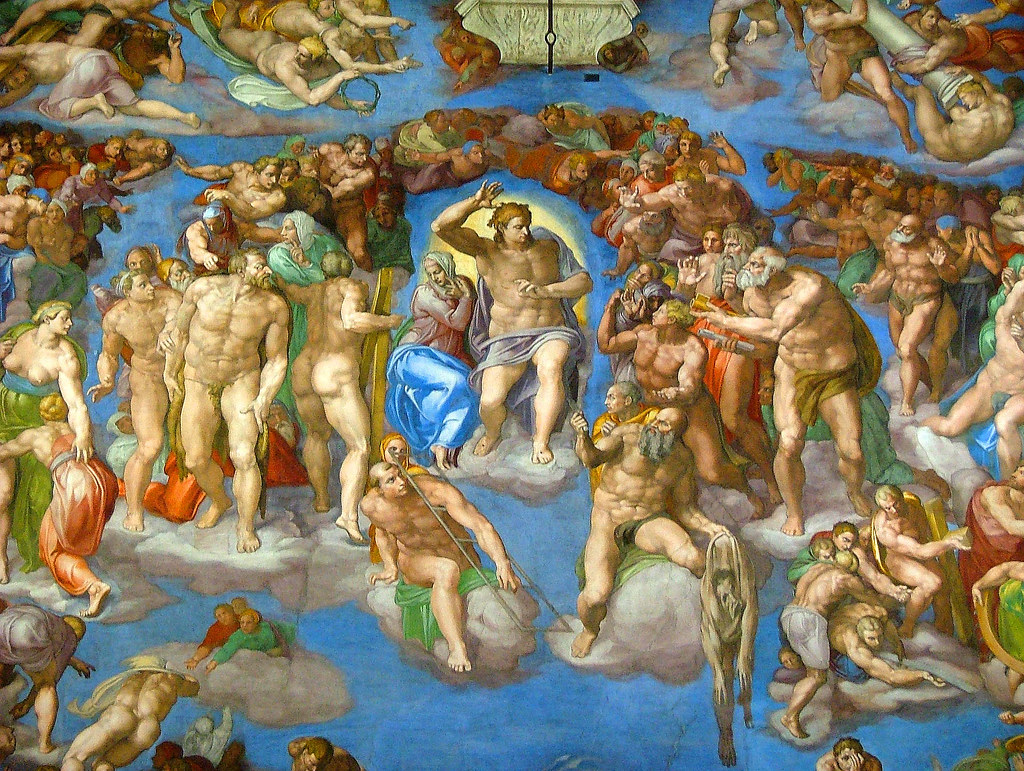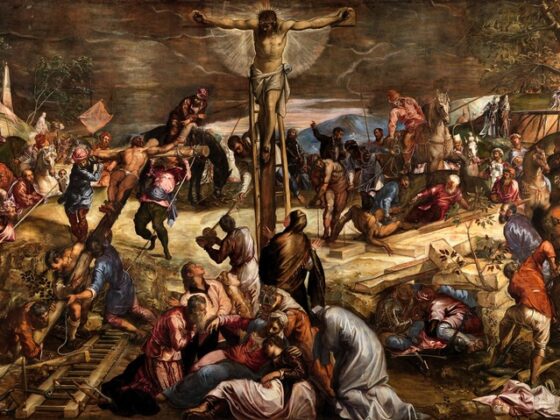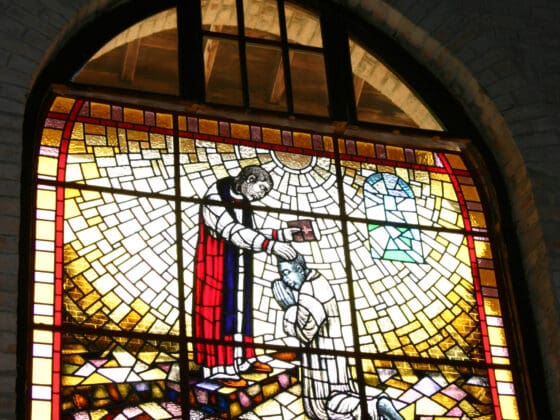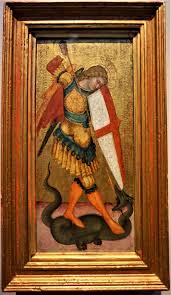Sermon Preached at Redeemer Anglican Church, Bellevue
August 8, 2021
Tenth Sunday after Pentecost
Lessons: Daniel 7:9-14; 1 Corinthians 15:50-58; Mark 13:23-32
After a two-week intermission, I am returning today to the Apostles’ Creed and in particular to the final phrase of the section on Jesus Christ our Lord, which reads: “he will come again to judge the living and the dead.”
This brief phrase is a summary of what theologians called eschatology, or “the last things”: death, judgment, heaven and hell. Let’s begin by admitting that there is much about these last things which is a mystery. The folk singer Iris DeMent puts the matter this way:
Everybody is a-wonderin’ what and where they all came from,
Everybody is a-worryin’ ’bout where
They’re gonna go when the whole thing’s done,
But no one knows for certain and so it’s all the same to me –
I think I’ll just let the mystery be.
While I agree that many of the last things are mysterious, I don’t find that people are a-wonderin’ and a-worryin’ enough about where they’re gonna go when the whole thing’s done. Rather, I think our society is in a state of denial. If “letting the mystery be” means a kind of collective shrug of the shoulders, many are going to wake up some day to profound regret.
As Christians, we may certainly ask the questions “how,” “why,” “when,” “where” about the last things – and I shall be coming back to these – but the fundamental question has to do with “Who” holds the future. This Person is Jesus Christ.
But did the phrase from the Apostles’ Creed come from Jesus? Yes, it did. He said so repeatedly to His disciples, as is the case in our Gospel text today. In the last days, He says, “they will see the Son of Man coming in clouds with great power and glory.”
So how did Jesus come to know this? These past weeks I have been speaking about “Jesus becoming Jesus,” how as the fully human and incarnate Word, Jesus learned about His identity and mission through the Hebrew Bible, the Old Testament. Earlier I suggested that Jesus learned from the book of Isaiah about His role as the Suffering Servant, who would give His life as a ransom for many.
Our lesson today from the book of Daniel is a second text which I think formed Jesus’ sense of His final coming in glory. Daniel chapter 7 describes a vision of the climax of world history in terms of four empires, increasingly tyrannical and culminating with a supreme Despot who forbids God’s Law, persecutes God’s people, and sets an idol of himself in God’s Temple. This figure is the Antichrist later described in the Book of Revelation as the Satanic beast. Now back to Daniel. At the climax of the vision, God Himself appears as an Ancient of Days – a all-powerful heavenly Patriarch – coming in glory to judge these evil empires. But He is not alone when he appears:
with the clouds of heaven there came one like a son of man, and he came to the Ancient of Days and was presented before him. And to him was given dominion and glory and a kingdom … and his kingdom is one that shall not be destroyed. (verses 13-14)
What is striking about this vision – and I think this is how Jesus understood it – is that the second figure is “a son of man,” that is, he is human, not a spirit or an angel. No, he is born of a woman, he is mortal, subject to the power of death. This vision answers the question posed in Psalm 8: “What is man that you are mindful of him, the son of man that you visit him?” The answer to this question is the One who is both Son of God and Son of Man, Jesus Christ.
There is a second striking question raised in of Daniel’s vision: is this son of man ascending to the throne of the Ancient of Days or descending with Him to judge the earth? Maybe both, like the angels ascending and descending on Jacob’s ladder. What Jesus and the Creed are saying is that the mission of God’s Son involved an ongoing movement from heaven to earth and back again, as the song says:
You came from heaven to earth, to show the way
From the earth to the cross, my debt to pay
From the cross to the grave, from the grave to the sky…
And there is a grand finale to this movement: His glorious return to judge the living and the dead.
So now that we know the Who who spoke of His coming again, let’s take a look at the questions: “how?” “why?” “when?” and where?” of the Last Things.
How will Christ return? The Nicene Creed adds the little phrase: He will come in glory. Jesus Christ is the radiance and exact imprint of the Father’s glory, which He possessed before all time (Heb 1:1-4). It is the glory He suppressed when He humbled Himself to be born in a stable in Bethlehem and to live the life of a servant. It is the glory which flashed forth momentarily on the Mount of Transfiguration. It is the enduring glory He received when He sat down at the right hand of the Father’s throne after the resurrection. And then there is the end. Jesus predicts an astounding explosion of that glory, saying: “Then will appear in heaven the sign of the Son of Man, and then all the tribes of the earth will mourn when they will see the Son of Man coming on the clouds of heaven with power and great glory” (Matt 24:30).
Why will Christ return? He will come again in glory “to judge the living and the dead,” that is, to judge every man and woman living or dead. (This clause, incidentally, upholds the biblical and historic Christian teaching that the human person is both body and soul. The body dies and is buried; the soul lives on in some state until the Day of Judgment.)
The idea of God as judge pervades the Bible. God is good and made all things good, but there is an Enemy who has rebelled against God and tempted mankind into sin. And the wages of sin, from Eden on, is death. In His mercy, God did not leave us dead in our sins and without hope, but He sent His Son to bear the judgment that should have been ours. And now, having raised Him from the dead, the Father has entrusted final judgment to His Son.
What is the basis for this final judgment? In Daniel’s vision, it states “the books were opened”; the same phrase used by John in the Book of Revelation:
And I saw the dead, great and small, standing before the throne, and books were opened. Then another book was opened, which is the book of life. And the dead were judged by what was written in the books, according to what they had done. (Rev 20:12)
Here is how I understand these account books. Those whose names are written in the book of life are the redeemed, those who have put their trust in the Lamb that was slain. Jesus is the way, the truth and the life. No one comes to the Father except through Him. At the same time, no good deed goes unrewarded in God’s eyes, nor is any sin overlooked. It is my view that even for believers there is a purging, a refining of sin, but in a strange sense we shall wish to be cleansed from our impurities (cf. 1 Cor 3:12-13).
What God desires is that believers repent of evil and do good, and that unbelievers repent and come to Christ. The ultimate sin, the sin of Satan, is to know God and refuse Him. So long as a person lives, the door remains open and Christ is knocking and asking to enter his heart. Without repentance, the verdict is sealed in the Second Death, which is separation from God in hell.
This leads to the next question: when will Christ come to judge? The Old Testament prophets speak repeatedly of the Day of the Lord coming at a time of God’s sovereign reckoning. As for the date and time of this coming, Jesus says: “Concerning that day and hour no one knows, not even the angels of heaven, nor the Son, but the Father only” (Matt 24:36). He goes on to say that the end will come as a complete surprise:
“For as were the days of Noah, so will be the coming of the Son of Man. For as in those days before the flood they were eating and drinking, marrying and giving in marriage, until the day when Noah entered the ark, and they were unaware until the flood came and swept them all away, so will be the coming of the Son of Man.” (verses 37-39)
So stay awake, Jesus says, for you do not know on what day your Lord is coming. (verse 42).
Another way of looking at this question is to say that we should consider the day of the Lord’s coming for us to be the day of our death. If somehow we are alive at that time, our situation before the Judge is no different. When I was a small boy, I somehow learned the prayer:
Now I lay me down to sleep,
I pray the Lord my soul to keep.
If I should die before I wake,
I pray the Lord my soul to take.
I suspect today this prayer is considered too scary for children. In earlier times and even in many parts of the world today, surviving to the next day, especially for children and the poor, is hardly to be assumed. And in any case, each one of us, young or old, has a due date with God. Forgetting this reality is part of what I am calling our collective amnesia. Think of those occupants in the condo collapse in Florida recently. They fell asleep in this world and woke up in another. So, Jesus says, keep awake with God, even as you sleep.
Now to a final question: where does the judgment take place? According to Daniel’s vision, God comes “with the clouds of heaven.” We naturally think of heaven as being “up there,” but only silly literalists were disturbed when Yuri Gagarin, the first man in space, reported back: “I looked and looked and looked and looked, but I did not see God.” Thoughtful Christians have always understood that heaven is a different dimension of reality from the up-down of our material world.
And the same distinction goes for the “where” of our final state. Going to heaven is not a change of location but a change of nature. When we speak of going to heaven when we die, we do not mean floating on clouds playing harps. The new creation, as we see in the final vision of the Book of Revelation, is not fluffy like a Hallmark card but something utterly foreign, a transformation of the good world God created in the beginning into something so marvelous that it can only be described in metaphors.
St. Paul puts it this way in our Epistle today:
Behold! I tell you a mystery. We shall not all sleep, but we shall all be changed, in a moment, in the twinkling of an eye, at the last trumpet. For the trumpet will sound, and the dead will be raised imperishable, and we shall be changed. For this perishable body must put on the imperishable, and this mortal body must put on immortality. (1 Cor 15:51-53)
In The Last Battle, the finale of C.S. Lewis’ Narnia books, the victors find themselves in front of a door. Suddenly the great lion Aslan, the Christ-figure, appears and roars: “Now it is time!” And the door opens. As Aslan stands in the door, all the creatures come streaming toward him. Judgment happens when they enter in at the door; but this is just the beginning of the end. “Further up and further in!” was Aslan’s cry to those pilgrims as they climb to higher and higher vistas. And as they do, they begin to meet other residents of Narnia from earlier stories and ages who are being transformed. The Apostles’ Creed returns to this glorious subject in its last phrases about “the communion of saints” and “life everlasting,” and we’ll return to it later.
So let’s come back to earth here and now. There is perhaps a proper Christian way to “let the mystery of the last things be.” In the next section of the Creed, we encounter the Third Person of the Trinity, who will dwell in our hearts as we await the glorious coming of our Lord Jesus Christ.
Without forgetting the glorious hope of Christ’s Return, we now return to our daily journey of faith, hope and love.
Maranatha! Come, Lord Jesus!





